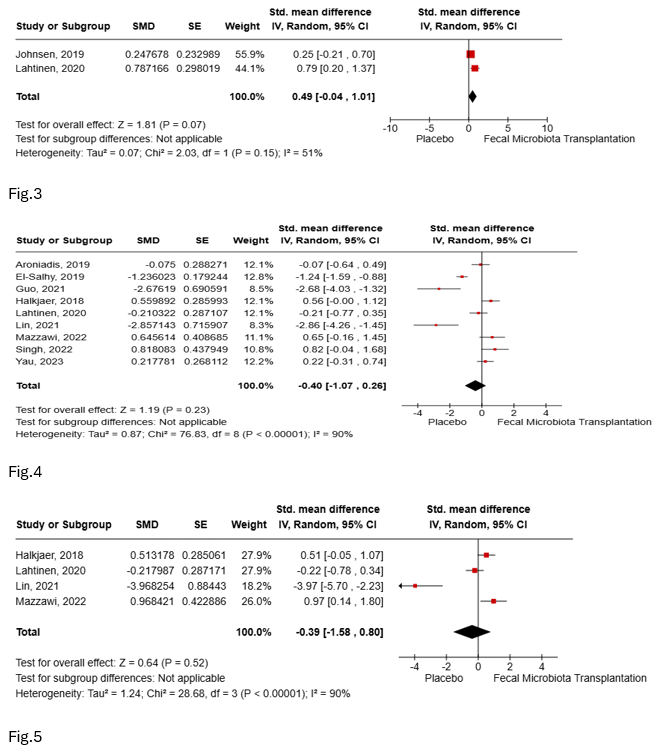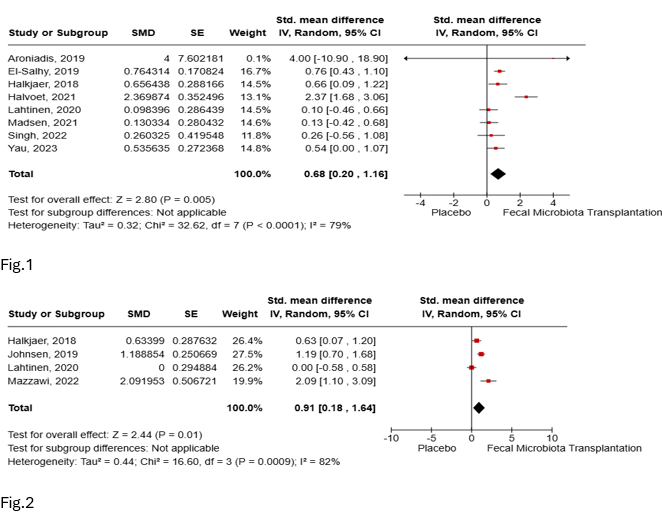Monday Poster Session
Category: Functional Bowel Disease
P2927 - Short-Term and Long-Term Outcomes of Fecal Microbiota Transplantation for the Treatment of Irritable Bowel Syndrome: A Systematic Review and Meta-Analysis
Monday, October 27, 2025
10:30 AM - 4:00 PM PDT
Location: Exhibit Hall

Shahryar Khan, MD
University of Kansas Medical Center
Kansas City, KS
Presenting Author(s)
Shahryar Khan, MD1, Hamza Asif, MD2, Muhammad Safwan Qazi, MBBS3, Roshaan Rehman, MBBS3, Mashal Alam Khan, MBBS4, Falak Hamo, MD5, Muhammad Waqar Elahi, MD6, Fariha Hasan, MD7, Noemy Coreas, MD8, Tuba Esfandyari, MD, FACG9
1University of Kansas Medical Center, Kansas City, KS; 2University of Louisville School of Medicine, Louisville, KY; 3Khyber Medical University, Peshawar, North-West Frontier, Pakistan; 4Khyber Medical University, Kansas City, KS; 5University of Kansas Medical Center, Overland Park, KS; 6West Virginia University School of Medicine, Morgantown, WV; 7Cooper University Hospital, Camden, NJ; 8National University of El Salvador, El Salvador, San Salvador, El Salvador; 9The University of Kansas Health System, Kansas City, KS
Introduction: Irritable bowel syndrome (IBS) is a chronic functional gastrointestinal disorder that significantly impairs the quality of life. Although its etiology is multifactorial, dysbiosis, or an imbalance in the gut microbiota, it is increasingly recognized as a potential contributor to its pathophysiology. The role of fecal microbiota transplantation (FMT) in managing IBS symptoms remains inconclusive, and studies on the long-term outcomes of FMT are limited. This study aimed to evaluate the short- and long-term efficacy of FMT in the treatment of IBS.
Methods: We conducted a comprehensive literature search of several databases from their inception through April 2025. Studies have investigated the short- and long-term efficacy of FMT compared with placebo in adult patients (≥18 years old) with IBS. The outcomes of interest were clinical response (CR), defined as either the resolution or improvement in IBS symptoms, IBS symptom severity score (IBS-SSS), IBS Quality of Life questionnaire (IBS-QoL), and adverse events. The random-effects model was used to calculate the standardized mean difference (SMD) and odds ratio (OR) with corresponding 95% confidence intervals for desired outcomes. Statistical significance was set at p value < 0.05. Heterogeneity was assessed using the I2 Index. Data analysis was performed using the Revman software (version 5.4.1).
Results: Twelve RCTs were included, with a total population of 607, of which 58.31% received FMT. The participants had an average age of 41.3, and 65.7% were female. Diarrhea-predominant IBS was the most common type, followed by mixed-type IBS. Compared to placebo, FMT is associated with improvement of IBS-QoL at 12 months (SMD 0.68, 95% CI 0.20-1.16, Fig.1), and 24 months (SMD 0.91, 95% CI 0.18-1.64, Fig.2) but at longer follow up of 54 weeks, no difference was found between the two groups in IBS-QoL (SMD 0.49, 95% CI -0.04 - 1.01, Fig.3). No significant difference was found in CR at 12 weeks (OR 2.84, 95% CI 0.68 - 11.97), IBS-SSS at 12 weeks (SMD -0.40, 95% CI -1.07 - 0.26, Fig.4), and 24 weeks (SMD -0.39, 95% CI -1.58 - 0.80, Fig.5). FMT was not associated with serious adverse events (OR 1.32, 95% CI 0.60 - 2.92).
Discussion: This study does not support FMT as a successful treatment strategy for IBS because of suboptimal clinical improvement. FMT improves the quality of life in the short term for IBS but is not maintained beyond 12 months. However, larger studies with longer follow-up periods are needed to examine the role of FMT in IBS.

Figure: Fig.1 Forest Plot of IBS QoL at 12 weeks; Fig.2 Forest Plot of IBS QoL at 24 weeks

Figure: Fig.3 Forest Plot of IBS QoL at 54 weeks; Fig.4 Forest Plot of IBS-SSS at 12 weeks; Fig.5 Forest Plot of IBS-SSS at 24 weeks
Disclosures:
Shahryar Khan indicated no relevant financial relationships.
Hamza Asif indicated no relevant financial relationships.
Muhammad Safwan Qazi indicated no relevant financial relationships.
Roshaan Rehman indicated no relevant financial relationships.
Mashal Alam Khan indicated no relevant financial relationships.
Falak Hamo indicated no relevant financial relationships.
Muhammad Waqar Elahi indicated no relevant financial relationships.
Fariha Hasan indicated no relevant financial relationships.
Noemy Coreas indicated no relevant financial relationships.
Tuba Esfandyari indicated no relevant financial relationships.
Shahryar Khan, MD1, Hamza Asif, MD2, Muhammad Safwan Qazi, MBBS3, Roshaan Rehman, MBBS3, Mashal Alam Khan, MBBS4, Falak Hamo, MD5, Muhammad Waqar Elahi, MD6, Fariha Hasan, MD7, Noemy Coreas, MD8, Tuba Esfandyari, MD, FACG9. P2927 - Short-Term and Long-Term Outcomes of Fecal Microbiota Transplantation for the Treatment of Irritable Bowel Syndrome: A Systematic Review and Meta-Analysis, ACG 2025 Annual Scientific Meeting Abstracts. Phoenix, AZ: American College of Gastroenterology.
1University of Kansas Medical Center, Kansas City, KS; 2University of Louisville School of Medicine, Louisville, KY; 3Khyber Medical University, Peshawar, North-West Frontier, Pakistan; 4Khyber Medical University, Kansas City, KS; 5University of Kansas Medical Center, Overland Park, KS; 6West Virginia University School of Medicine, Morgantown, WV; 7Cooper University Hospital, Camden, NJ; 8National University of El Salvador, El Salvador, San Salvador, El Salvador; 9The University of Kansas Health System, Kansas City, KS
Introduction: Irritable bowel syndrome (IBS) is a chronic functional gastrointestinal disorder that significantly impairs the quality of life. Although its etiology is multifactorial, dysbiosis, or an imbalance in the gut microbiota, it is increasingly recognized as a potential contributor to its pathophysiology. The role of fecal microbiota transplantation (FMT) in managing IBS symptoms remains inconclusive, and studies on the long-term outcomes of FMT are limited. This study aimed to evaluate the short- and long-term efficacy of FMT in the treatment of IBS.
Methods: We conducted a comprehensive literature search of several databases from their inception through April 2025. Studies have investigated the short- and long-term efficacy of FMT compared with placebo in adult patients (≥18 years old) with IBS. The outcomes of interest were clinical response (CR), defined as either the resolution or improvement in IBS symptoms, IBS symptom severity score (IBS-SSS), IBS Quality of Life questionnaire (IBS-QoL), and adverse events. The random-effects model was used to calculate the standardized mean difference (SMD) and odds ratio (OR) with corresponding 95% confidence intervals for desired outcomes. Statistical significance was set at p value < 0.05. Heterogeneity was assessed using the I2 Index. Data analysis was performed using the Revman software (version 5.4.1).
Results: Twelve RCTs were included, with a total population of 607, of which 58.31% received FMT. The participants had an average age of 41.3, and 65.7% were female. Diarrhea-predominant IBS was the most common type, followed by mixed-type IBS. Compared to placebo, FMT is associated with improvement of IBS-QoL at 12 months (SMD 0.68, 95% CI 0.20-1.16, Fig.1), and 24 months (SMD 0.91, 95% CI 0.18-1.64, Fig.2) but at longer follow up of 54 weeks, no difference was found between the two groups in IBS-QoL (SMD 0.49, 95% CI -0.04 - 1.01, Fig.3). No significant difference was found in CR at 12 weeks (OR 2.84, 95% CI 0.68 - 11.97), IBS-SSS at 12 weeks (SMD -0.40, 95% CI -1.07 - 0.26, Fig.4), and 24 weeks (SMD -0.39, 95% CI -1.58 - 0.80, Fig.5). FMT was not associated with serious adverse events (OR 1.32, 95% CI 0.60 - 2.92).
Discussion: This study does not support FMT as a successful treatment strategy for IBS because of suboptimal clinical improvement. FMT improves the quality of life in the short term for IBS but is not maintained beyond 12 months. However, larger studies with longer follow-up periods are needed to examine the role of FMT in IBS.

Figure: Fig.1 Forest Plot of IBS QoL at 12 weeks; Fig.2 Forest Plot of IBS QoL at 24 weeks

Figure: Fig.3 Forest Plot of IBS QoL at 54 weeks; Fig.4 Forest Plot of IBS-SSS at 12 weeks; Fig.5 Forest Plot of IBS-SSS at 24 weeks
Disclosures:
Shahryar Khan indicated no relevant financial relationships.
Hamza Asif indicated no relevant financial relationships.
Muhammad Safwan Qazi indicated no relevant financial relationships.
Roshaan Rehman indicated no relevant financial relationships.
Mashal Alam Khan indicated no relevant financial relationships.
Falak Hamo indicated no relevant financial relationships.
Muhammad Waqar Elahi indicated no relevant financial relationships.
Fariha Hasan indicated no relevant financial relationships.
Noemy Coreas indicated no relevant financial relationships.
Tuba Esfandyari indicated no relevant financial relationships.
Shahryar Khan, MD1, Hamza Asif, MD2, Muhammad Safwan Qazi, MBBS3, Roshaan Rehman, MBBS3, Mashal Alam Khan, MBBS4, Falak Hamo, MD5, Muhammad Waqar Elahi, MD6, Fariha Hasan, MD7, Noemy Coreas, MD8, Tuba Esfandyari, MD, FACG9. P2927 - Short-Term and Long-Term Outcomes of Fecal Microbiota Transplantation for the Treatment of Irritable Bowel Syndrome: A Systematic Review and Meta-Analysis, ACG 2025 Annual Scientific Meeting Abstracts. Phoenix, AZ: American College of Gastroenterology.
